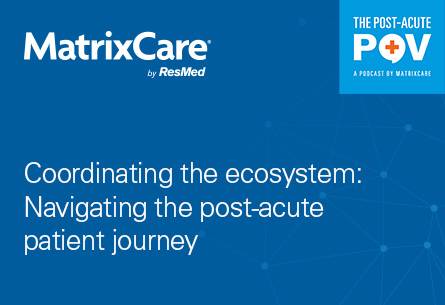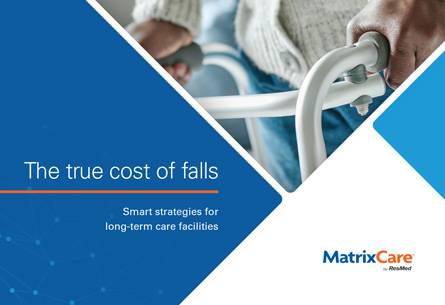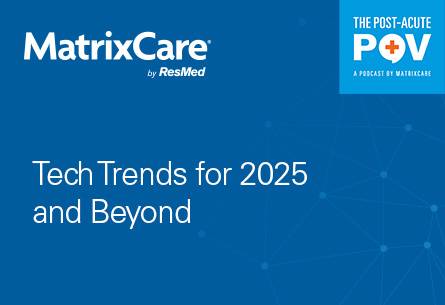In this episode of the Post-Acute POV, our host Amy Wootton, RDN, Director of Nutrition, MatrixCare, is joined by Anita Hoffman, Director of Culinary Service and Nicole Fresta, Clinical Dietitian, Palm Garden Health and Rehabilitation Center, for a conversation on managing food allergens across post-acute care.
Listen in as Amy, Anita, and Nicole discuss the importance of identifying and documenting food allergies, surprising factors that can lead to an allergic reaction, and tips for managing a resident’s food allergies via their plan of care. This episode will describe the severity of managing food allergens and introduce how MealTracker’s new allergen feature can help. Listen to their discussion below.
Topics discussed during today’s episode:
- [01:21 – 02:07]: Anita and Nicole both provide their origin stories and how they found their focus on nutrition in long-term care.
- [02:25 – 02:48]: Anita explains why managing food allergens is so important.
- [02:58 – 04:10]: Nicole provides her recommendations for managing a resident with food allergies including working with their plan of care and documentation.
- [04:43 – 05:32]: Nicole explains some of the common factors that can lead to an allergic reaction when preparing food for a resident.
- [06:04 – 08:00]: Anita and Nicole detail their experience with MealTracker, including how long Palm Garden has used the product and which features they use most often.
- [08:24 – 10:24]: The pair discuss the benefits they’ve experienced using the new allergen feature that MealTracker provides.
Resources
- Learn more about nutrition management at MatrixCare: https://matrixcare.com/nutrition-management/
- Find out more about Palm Garden: https://palmgarden.com/
- Listen to more episodes of the Post-Acute POV
Transcript
Speaker 1
Hi, and welcome to The Post-Acute POV. Our discussion hub for healthcare technology in the out-of-hospital space. Here, we talk about the latest news and views on trends and innovation that can impact the way Post-Acute Care providers work. And we take a look at how technology can make a difference in today’s changing healthcare landscape. In both home-based and facility-based care organizations, and the lives of the people they serve. Today, we hear from Navin Gupta, Senior Vice President of home and hospice division for MatrixCare and his special guest. Let’s dive in.
Amy Wootton
Welcome to another episode of the Post-Acute POV. Hi this is Amy Wootton, Registered Dietician, Director of Nutrition Management, with MealTracker for MatrixCare. And I want to thank you all for joining us today. I’m here with Anita Hoffman, Director of Culinary Service at Palm Garden, and Nicole Fresta, Clinical Dietician. Today we’re going to be talking about managing food allergies. Food allergies remain an increasing health risk in our senior population. An estimated 10% of adult population has a known food allergy. The aging process reduces the immune system, which can bring on late-onset of food allergies. So great to have you join us, Anita and Nicole. Can you both share your origin stories with our audience? How about you go first, Anita.
Anita Hoffman
I have been in long-term care since 1989. And when I first started the food service departments were not using any type of computer software. So it was pretty much up to the tray line staff to determine what they were going to serve to the residents who had either diet combinations, or many food dislikes, or food aversions. So when MealTracker was implemented, then it transformed the meal service to the residents.
Amy Wootton
Wow. And how about you, Nicole?
Nicole Frest
So I started at Palm Garden in 2015. This was actually the start of my career as a dietician. So far MeaTracker has been very, very easy to use, and there’s always new features that are coming out to make my job easier.
Amy Wootton
Great, good to hear. That’s great that you’ve started out there and have grown while using the system with us. Nutrition therapy is such a great topic and a focus on managing food allergies is so critical. Anita, can you tell our listeners why managing food allergies is so important at your facility or your organization?
Anita Hoffman
Of course. First and foremost, not serving a food item that the resident is allergic to is paramount. Many allergies result in anaphylactic shock episodes, which are a medical emergency. In milder cases, the allergic reaction may cause discomfort at the very least. And this is also considered an actual harm situation, or could be immediate jeopardy.
Amy Wootton
Yes, it’s so critical. And Nicole, what do you recommend when it comes to management for a resident with food allergies, and their plan of care, and documentation and such?
Nicole Fresta
So when there’s a new resident that comes into my buildings, I review the medical record and make sure when there is a medication allergy, that sometimes these might translate to food allergies; such as iodine, or the flu vaccine. Or I’ve seen even latex translate to the food allergies and intolerances. Our team, whether it’s me or the culinary manager, or we confirm with the resident, or the family member. To make sure there’s no food allergies when we see these listed.
Nicole Fresta
For example, when I see an iodine allergy, I go check with the resident or the family member to make sure that it is only the dye. But sometimes I do find that there is a shellfish allergy when there’s an iodine. When I do see the iodine allergy and the shellfish isn’t in there, I will make sure to add the shellfish allergy to their medical record. So going forward, wherever they go it’ll follow them. I also ask the new residents or patients when they first come in to make sure they don’t have any allergies that are listed… food allergies that are listed. Because sometimes there’s just random allergies that they might have and they say, “Oh yeah, I have a mango allergy.” I’m sure to add that to their medical record and to MealTracker.
Amy Wootton
Yeah. Sometimes you’re the first person that triggers that reminder about food items. When you interview the resident, right? I’ve often found that in my past life as well, or quite often the dietician or the food representative is the one who finds that food allergy, that the resident remembered that they had. So great of you to share that with us and the importance of how we gather the information. Anita or Nicole, I understand there are risks that caregivers should know about. Can you talk about some of the common factors that can lead to a food allergy reaction?
Nicole Fresta
So it’s important to know what ingredients are being used to prepare [inaudible 00:04:46]. A meal can be prepared so many different ways of different spices, or flavors, depending on who the cook is. In our facilities, it’s important to follow our standardized recipes when cooking for these large number of people so that the allergens can be avoided. And this goes hand in hand with the meal tracker update. Another thing is, avoiding food contamination on the meal prep surfaces, and keeping them clean and away from potential allergens. For example, when you’re trying to prepare a peanut butter and jelly sandwich on a cutting board, and then you’re going to prepare something like an egg salad sandwich after that. And knowing that there’s a peanut allergy in the building, you want to keep away those allergens from…
Amy Wootton
Oh, I get it, the cutting board. You want to make sure that you’re not sharing the allergen risk from one resident to another, for sure, by contaminating it so to speak. Right? So, and following the standardized recipe, that’s a key thing to remind our listeners for sure. That if you don’t follow the recipe appropriately, when cooking you can cause risk for an allergic reaction.
Amy Wootton
Anita, how long have you been using MealTracker software? Can you tell us a little bit about… my understanding is the corporate module and the benefits from that?
Anita Hoffman
Yes. So I’ve been a user of MealTracker for at least 16 years. The corporate module allows me to centralize the menus to manage the food items. As far as consistency, modifications, and portions in a central program. I also have the ability to assign specific access to each user and then can secure the menu and food items. And was such a focus on food service safety, this is important.
Amy Wootton
Absolutely. I agree. And you want to make sure you’re being consistent across the board. You want to make sure your menu’s appropriate across the board. So having that oversight is critical to a large organization like yourself. Nicole, can you share your experience using MealTracker at the facility level as a user?
Nicole Fresta
So everything is very user-friendly and if there is anything that maybe Anita can answer for me, the customer service at MealTracker is great. Everything from adding or editing residents, and maybe special diets, or food preferences that they have is easy to input. And there’s so many reports that can be generated for each building for them to use and stuff. Very helpful.
Amy Wootto
Great, good to know. Thanks for that. Anita what made you interested in participating? I understand we started a pilot on an allergen feature and understand you were so eager to join. What made you willing to participate in this feature?
Anita Hoffman
I was intrigued by the allergen system because I thought that it would really help us define allergens a whole lot better than just using group foods. And I always like testing new programs. I’m always willing to do that.
Amy Wootton
Yeah and you’re a great advocate for our customer base, for sure. Nicole, when you saw the conversion step that MealTracker took to help current users move to the new allergen feature, that process that was automatically done for you. What’d you think about that?
Nicole Fresta
It certainly made the conversion easier than having to start from scratch, and provided that continuing at the avoiding the foods that we wanted to. And we did need to do some cleanup into remission, but it wasn’t too bad.
Amy Wootton
Perfect, that’s great to hear. And Anita, how did you see the resident profile management more superior and MealTracker using the allergen feature?
Anita Hoffman
I think the allergen feature is much more accurate in identifying specific foods rather than using the group feature. The different allergens in a specific food can be identified at the food level rather than trying to make sure that the food is in multiple groups. It is also much easier to match up to our EMR. And it’s also a lot cleaner the way it prints on the ticket.
Amy Wootton
Oh I agree, I agree. What additional benefits do you see from using an isolated allergen feature, maybe in the tolerable items? Can you talk about the trade ticket or food item details?
Anita Hoffman
Being able to identify the tolerable items is a great feature. Especially with the dairy or milk allergy. Because as we are aware as dieticians, most of the time this is not a true allergy. It is just an intolerance, but people use that term interchangeably.
Amy Wootton
Right.
Anita Hoffman
So they insisted it’s an allergy, we have to treat it as such, but then we would be able to identify these tolerable items. The tray ticket is much cleaner and easier to read as far as the specific allergies are concerned. And it’s also consistent instead of each center putting the information in different places.
Amy Wootton
Oh yes, I agree. You’ve covered a lot. Now, can you recap your opinion of the benefits of MealTracker’s latest feature?
Anita Hoffman
I think this feature is a big step forward in assisting us in managing this area of residents’ safety.
Amy Wootto
I agree, I agree. Thank you. Thank you both. Can you tell our listeners about how you use MealTracker for your operations in general?
Anita Hoffman
I encourage our managers to utilize every feature of MealTracker to assist them in providing efficient service, controlling costs, scheduling, and production, resident needs, and preferences. It’s a great system for integrating residents’ clinical needs with the operation of the kitchen.
Amy Wootton
Great. Can you share any more information for dining leaders out there and dieticians in similar environments before we close out?
Anita Hoffman
I’ve looked at several different software programs for dietary service, and MealTracker is by far the most comprehensive in integrating the clinical functions with the operation systems in the kitchen.
Amy Wootton
Wow, that’s great ladies. While senior care facilities cannot expect to be completely free of foods that cause allergic reactions to each resident. Leaders can implement and maintain a safe environment for those residents with food allergy as you’ve mentioned throughout this interview. Thank you for joining us today. We had a great topic, MealTracker Management of Food Allergens. I also want to thank Anita and Nicole for the wealth of information. Again, thanks for sharing. With the growing population of seniors being identified with allergies, it is a critical path to follow to pay detailed attention. I encourage listeners to check out our allergen feature and MealTracker, which improves residents’ safety of those with food allergies. Thank you both today.
Anita Hoffman
Thank you.
Nicole Fresta
Thank you.
Speaker 1
That concludes the latest episode of the Post-Acute POV from MatrixCare. We have a lot of guests and topics coming up that you won’t want to miss. So be sure to subscribe. If you’ve enjoyed today’s podcast, and if you have a topic you’d like us to discuss, leave us a review. To learn more about MatrixCare and our solutions and services, visit matrixcare.com. You can also follow us on LinkedIn, Twitter, and Facebook. Thank you for listening, be well. And we’ll see you next time.




